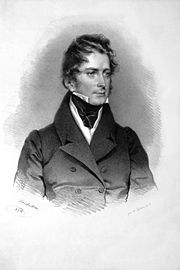
Karl Ernst Jarcke
Encyclopedia

He belonged to a Protestant merchant family. He took up the study of jurisprudence
Jurisprudence
Jurisprudence is the theory and philosophy of law. Scholars of jurisprudence, or legal theorists , hope to obtain a deeper understanding of the nature of law, of legal reasoning, legal systems and of legal institutions...
, and became at an early age professor of criminal law at Bonn
Bonn
Bonn is the 19th largest city in Germany. Located in the Cologne/Bonn Region, about 25 kilometres south of Cologne on the river Rhine in the State of North Rhine-Westphalia, it was the capital of West Germany from 1949 to 1990 and the official seat of government of united Germany from 1990 to 1999....
and later in Berlin. His scholarly attachments were especially revealed in his Handbuch des gemeinen deutschen Strafrechts (3 vols., 1827–30). Longing for faith and overcome by the conclusively and immensity of Catholic dogma, as he found it disclosed in the decrees of the Council of Trent
Council of Trent
The Council of Trent was the 16th-century Ecumenical Council of the Roman Catholic Church. It is considered to be one of the Church's most important councils. It convened in Trent between December 13, 1545, and December 4, 1563 in twenty-five sessions for three periods...
, he converted to Catholicism in Cologne
Cologne
Cologne is Germany's fourth-largest city , and is the largest city both in the Germany Federal State of North Rhine-Westphalia and within the Rhine-Ruhr Metropolitan Area, one of the major European metropolitan areas with more than ten million inhabitants.Cologne is located on both sides of the...
in 1824. After the outbreak of the July Revolution
July Revolution
The French Revolution of 1830, also known as the July Revolution or in French, saw the overthrow of King Charles X of France, the French Bourbon monarch, and the ascent of his cousin Louis-Philippe, Duke of Orléans, who himself, after 18 precarious years on the throne, would in turn be overthrown...
in Paris, he wrote an anonymous political brochure, Die franzosische Revolution von 1830. It met the emphatic approval of the circle of friends of the then Crown Prince (later King Frederick William IV of Prussia
Frederick William IV of Prussia
|align=right|Upon his accession, he toned down the reactionary policies enacted by his father, easing press censorship and promising to enact a constitution at some point, but he refused to enact a popular legislative assembly, preferring to work with the aristocracy through "united committees" of...
), which was composed of men of anti-revolutionary views, influenced by Romanticism
Romanticism
Romanticism was an artistic, literary and intellectual movement that originated in the second half of the 18th century in Europe, and gained strength in reaction to the Industrial Revolution...
and by Karl Ludwig von Haller
Karl Ludwig von Haller
Karl Ludwig von Haller was a Swiss jurist. He was the author of Restauration der Staatswissenschaften , a book which Hegel strongly criticized in Elements of the Philosophy of Right...
.
Jarcke assumed the editorship of the periodical Politische Wochenblatt, founded by these men in 1831 to promote their ideas. In 1832 Metternich called him to the State Chancery in Vienna to succeed the late Friedrich von Gentz
Friedrich von Gentz
Friedrich von Gentz was a German publicist and statesman.-Early years:Gentz was born at Breslau.His father was an official, his mother distantly related to the Prussian minister Friedrich Ancillon...
. He accepted the call, but continued an active collaborator of the weekly journal. The residence in Vienna did not satisfy him. In 1837 he broke with his Berlin friends on the subject of the "Cologne Occurrence" -- the imprisonment of the Archbishop of Cologne—of which they approved but which he condemned. In 1838 he founded with George Phillips
George Phillips (canon lawyer)
George Phillips was a German canon lawyer.-Life:He was the son of James Phillips, an Englishman who had acquired wealth as a merchant in Königsberg, and of a Scotchwoman née Hay...
the Historisch-politische Blatter to support Catholic interests in Germany. When Metternich was overthrown in 1848 Jarcke left Vienna, but returned there when order was restored, and died shortly after.
His ideal was the "Germanic State" of the Middle Ages; at its head an hereditary monarch, all claims of the princes on their subjects to be regulated by treaties, the state to be occupied only with the defence in war and the administration of justice; in domestic affairs entirely unrestricted opportunities for development within the confederacy. Of "political necessities", "measures for the welfare of the state", and of a "constitution" Jarcke wished to know nothing, except perhaps of a restriction of the royal prerogative by an advisory popular assembly, which however must be representative of the professions and the interests at stake, not merely founded on a general or property qualification franchise. In his articles on the relations between Church and State he combatted especially the Protestant and Liberal views. In seeming contradiction to his anti-revolutionary year of 1848, he took a willing part in the Catholic movement which began at that time.

